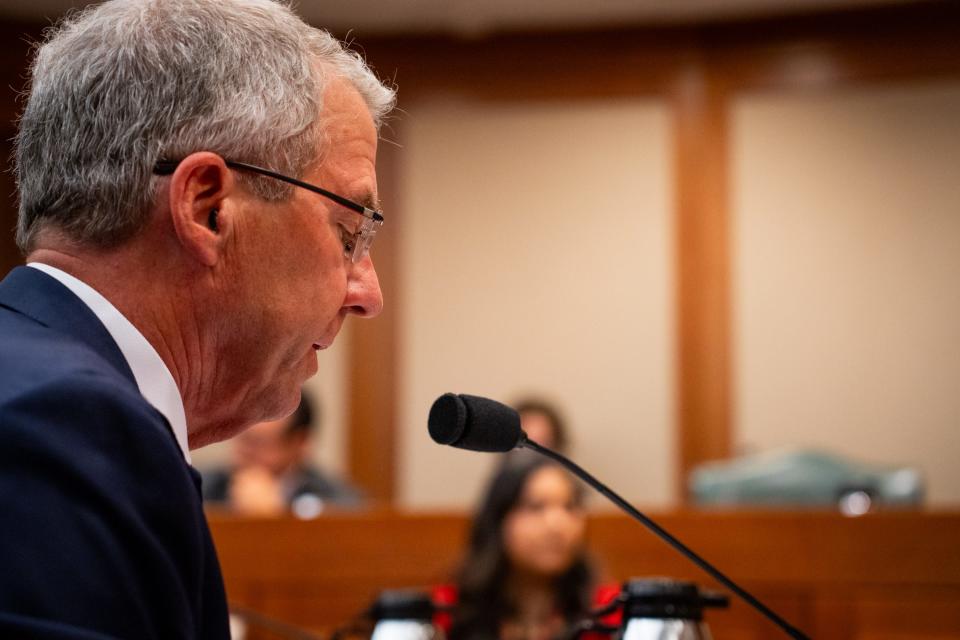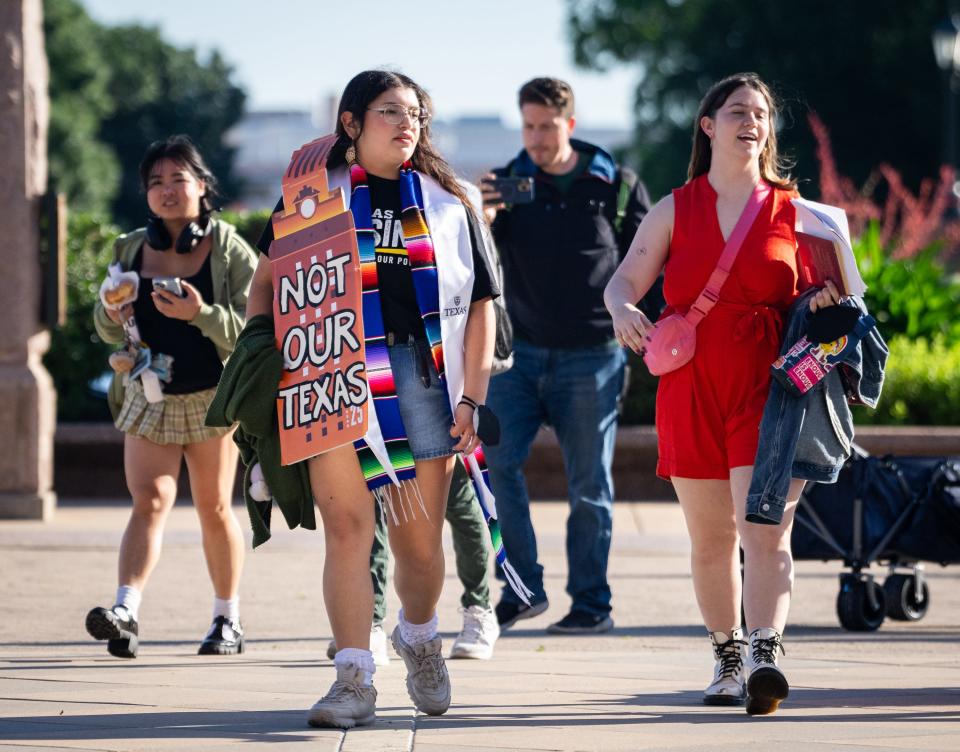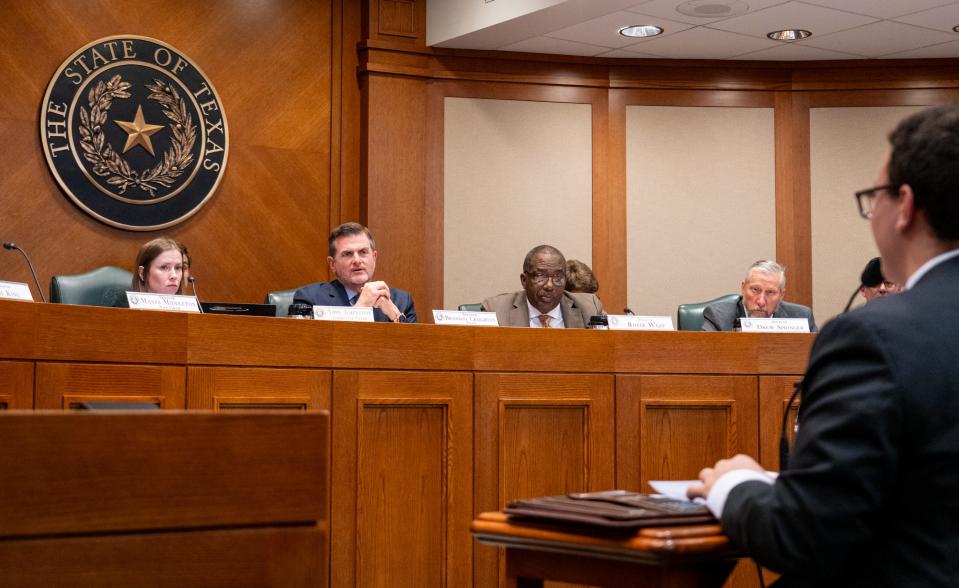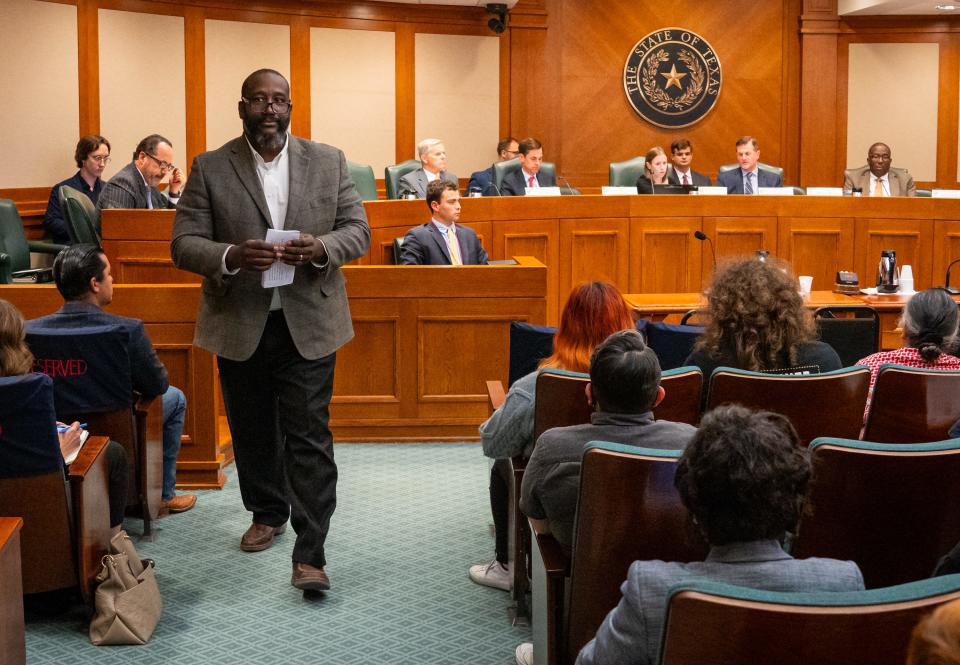Texas lawmakers probe universities' compliance with anti-DEI law, free speech: Our takeaways
- Oops!Something went wrong.Please try again later.
A Senate Education subcommittee held a hearing on Senate Bill 17, which bans diversity, equity and inclusion offices at public universities, and on free speech on college campuses, including discussions on antisemitism and pro-Palestinian protests.
The hearing Tuesday lasted nearly 11 hours and 148 people gave public testimony.
Though the subcommittee couldn't take action at the hearing, Sen. Brandon Creighton, R-Conroe, who chairs the committee and authored SB 17, said the hearing will inform next session's agenda.
Here are five takeaways from the hearing:
How the UT System is saving $25 million by complying with Texas anti-DEI law
University of Texas System Chancellor J.B. Milliken joined other system chancellors in laying out to the subcommittee how their institutions of higher education have complied with SB 17, which went into effect Jan. 1.
Milliken said UT System institutions are collectively saving $25 million by eliminating jobs and offices to comply with SB 17. Across the system, 21 offices closed, 311 full- and part-time positions have been eliminated, and 681 contracts, programs and trainings were cut, he said.

The 311 positions include terminations at UT in Austin on April 2, which were part of the flagship's school's reorganization after SB 17.
Alicia Moreno, a staff member who used to work in DEI before Jan. 1 and was terminated from UT on April 2, gave public testimony to the subcommittee Tuesday, and said she believes many of the program cuts were unnecessary, such as the elimination of Monarch, a program designed to help immigrant students and students without documentation without regard to race.
More: About 150 people testify at Texas Senate hearing on SB 17, college free speech. Here's why
Free speech on campus can only be limited with time, place, manner
Steven Collis, director of the Bech-Loughlin First Amendment Center and a professor at UT School of Law, testified about the First Amendment. He said government can censor:
True threats with imminent harm.
Calls to violence.
Heckler's veto ― meaning someone shouting over another as to prevent their speech.
Universities can place "reasonable" time, manner and place restrictions on free speech, as long as they are content neutral, he said.
Collis added that physical harm or harm to property and blocking access to buildings or roads does not qualify as speech. But, he noted, hate speech is not defined nor restricted in U.S. law.

Were UT protests antisemitic?
Levi Fox, a UT Jewish sophomore who was invited by the subcommittee to testify in a panel at the hearing Tuesday alongside Collis as well as the director of policy from the Anti-Defamation League, an anti-hate advocacy group, said he faced antisemitism at the protests and believes the demonstrations make Jewish students fearful on campus.

After the testimony, in response to a direct question from Creighton about if he'd agree the protests across the country and at UT "were anti-Jewish protests in their very nature?" Milliken said elements of the protests were, citing the student's testimony.
“Not everybody involved is an antisemite and as you heard from the law professor, we value free speech, political speech, all of that," Milliken said. "It's when it crosses a line with threats, intimidation — creating an environment where students cannot pursue their education.”
But multiple people ― including from Jewish students who participated in the protests ― testified to the committee that antisemitism was being "weaponized" to censor anti-Israel speech, and that they did not feel threatened because of their faith at the protests. People also asked why no pro-Palestinian protester or advocate was invited by the subcommittee to speak on the panel.
UT cut funding for student groups. Texas A&M didn't.
Texas A&M System Chancellor John Sharp said the system's legal advice has been to not cut financial support for student groups, because students are specifically exempt in the law. At UT, university-sponsored student groups that perform DEI-related functions lost their school sponsorship and funding ― leaving groups on their own to find funding for cultural events and graduations.

The UT-sponsored groups, who were housed under the now-shuttered Multicultural Engagement Center and had their own university spaces and privileges, are now registered organizations.
Texas SB 17's full effect remains unknown
UT System's general counsel said officials are struggling to figure out SB 17's impact on grants, which sometimes require information about a school's DEI-related efforts.
SB 17 has a carve out for grants, writing that "nothing (prohibited) may be construed" to affect someone's ability to submit a statement for a grant highlighting work to support "underserved students," first-generation or low-income students.
But public testimony also reflected confusion and frustration with how to handle the requirement.
See complete coverage of the hearing and the testimony.
This article originally appeared on Austin American-Statesman: The Senate higher ed hearing lasted 11 hours. Here are 5 takeaways

